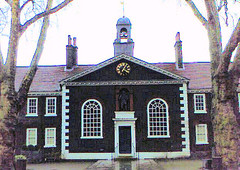By Natalie Bennett
The Union Theatre, though modest in appearance and resources, puts on some very fine shows. The London Ensemble’s interpretation of Medeia, which opened this week, is, unfortunately, not among them.
The problem, perhaps, started with the concept, stated in the programme as being to provide an “accessible new version” of Euripides’ account. That means you get the language of the great ancient tale of the human condition reduced to the sort of psychobabble you find in the “women’s pages” of middle-market newspapers.
So Aigeas tells Medeia, in an apparent attempt at consolation, that Kreon’s decision to leave her is just men being men: “Any man would do the same – a younger model comes along.” Medeia laments to the chorus of Corinthian women “I thought I’d find my feet here”, but assures them she’s not against them: “It is my husband I have issues with.” Kreon assures Medeia: “It’s not in my nature to be a bully.” The language never gets beyond cliche.
And the production is big on exposition – telling the tale rather than showing it – just in case any member of the audience should not be aware of the story. That which should be left unsaid, left to hang in the air, is said, or rather shouted – for this is a production big on ranting and raving.
Continue reading
